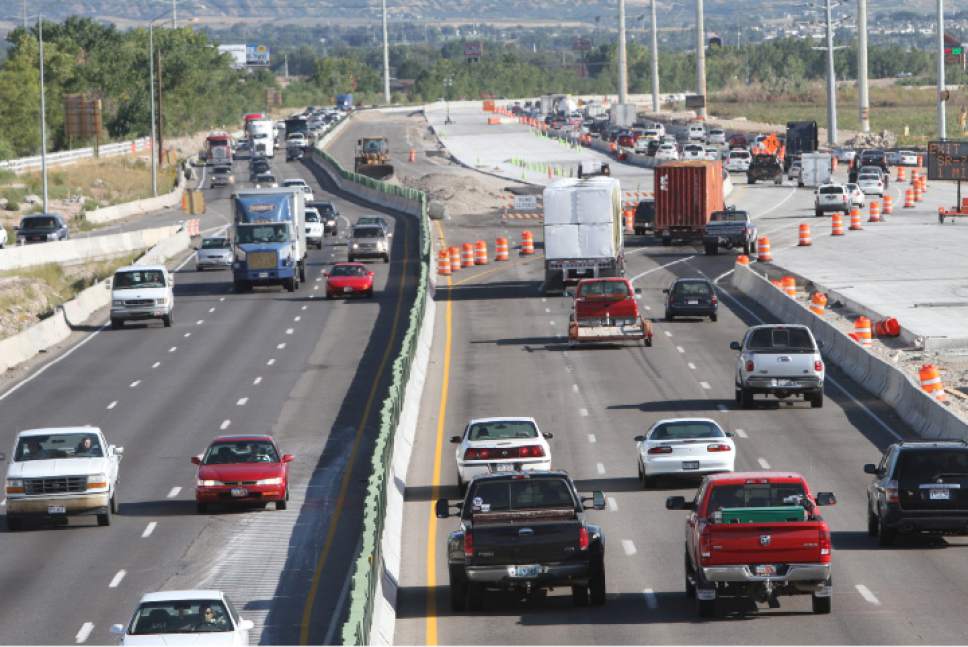This is an archived article that was published on sltrib.com in 2016, and information in the article may be outdated. It is provided only for personal research purposes and may not be reprinted.
Colorado envies Utah's transportation system and the taxes that built it — so 160 civic and business leaders, including Gov. John Hickenlooper, came to hear Beehive State officials offer some secrets for success Friday.
"While we strive to be the best department of transportation in the country, I would say our target right now would be the Utah Department of Transportation" as perhaps the best, Shailen Bhatt, the new executive director of the Colorado Department of Transportation, told the group at Grand America Hotel.
Some things Bhatt said he envies include:
• Utah spends about $660 million a year on highway projects to expand capacity, while Colorado spends $159 million.
• Colorado depends on federal funding for 65 percent of its highway spending; Utah relies on it for only about 25 percent.
"Why is traffic so much better in Utah?" he asked, "I have a two-lane road, they have a four-lane road. I got a four-lane road, they have a six-lane road. I have a six-lane road, they have a bloody light rail."
Bhatt said, "It's because in the last 10 years they have raised their taxes [for transportation] three times," and he said Colorado hasn't had a major tax increase for highways since 1991.
Officials say that has led to spending billions on such Utah advances as rebuilding Interstate 15 in Salt Lake and Utah counties; building the new Mountain View Corridor and Legacy Parkway; and constructing the TRAX and FrontRunner rail systems.
Carlos Braceras, executive director of UDOT, said the secret to building support for tax increases is to listen to residents and leaders about what they want, develop a consensus plan to achieve it, and establishing trust that money will be spent wisely.
"The secret sauce in Utah," he said, "comes down to this idea of cooperation."
Andrew Gruber, executive director of the Wasatch Front Regional Council, said that started with the Envision Utah process to survey residents and local communities about what they want their communities to be like in the future, and then develop transportation and other plans around that.
"We start from the bottom up and we ask the question: What is most important to you," he said. Then, he added, the government can show how different approaches or spending could affect that vision.
"With that good information, they are making decisions. We are not coming in trying to tell them this is the right way to grow in the future," he said.
Braceras said it's all about building from a solid foundation.
"If you start with values-based discussion and you build from that, you're going to find that you get to consensus much, much easier," he said.
Gruber added that officials in Utah also prepared a statewide transportation plan outlining envisioned highway and transit projects — and how much more funding is needed for them.
He said showing funding shortfalls helped, for example, to persuade the Legislature last year to pass a bill to increase the gasoline tax by a nickel a gallon, and allow counties to vote on local sales tax increases for local roads and transit.
Another essential ingredient to success, Braceras said, is developing trust that public agencies are being transparent and will spend money wisely.
"If you expect to go to your legislature and say you need a gas-tax increase, but they don't have ultimate trust in you as an organization, that you will take care of that pot of gold … you're not going to be successful," he said.
He said the way to build trust is with a track record of delivering projects on time and under budget, and being transparent.
"If somebody asks for information, as soon as you say no, they start to lose trust in you," he said. "We can lose trust in a minute, and it will take years to build back up."
The Colorado leaders were brought to Utah through the Denver Metro Area Chamber Leadership Foundation, and shared information with Utah leaders on a variety of topics.





